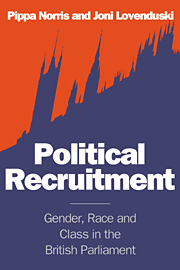Book contents
- Frontmatter
- Contents
- List of figures
- List of tables
- Preface
- 1 Puzzles in political recruitment
- Who selects and how?
- Who gets selected, and why?
- 6 Supply and demand explanations
- 7 Gatekeeper attitudes
- 8 Candidate resources
- 9 Candidate motivation
- 10 Comparative candidate recruitment
- Does the social bias matter?
- Appendix A Details of the survey design and sample
- Appendix B Questionnaires
- Notes
- Bibliography
- Index
7 - Gatekeeper attitudes
Published online by Cambridge University Press: 07 December 2009
- Frontmatter
- Contents
- List of figures
- List of tables
- Preface
- 1 Puzzles in political recruitment
- Who selects and how?
- Who gets selected, and why?
- 6 Supply and demand explanations
- 7 Gatekeeper attitudes
- 8 Candidate resources
- 9 Candidate motivation
- 10 Comparative candidate recruitment
- Does the social bias matter?
- Appendix A Details of the survey design and sample
- Appendix B Questionnaires
- Notes
- Bibliography
- Index
Summary
Discrimination by party gatekeepers is probably the most common explanation of the social bias in parliament. It is easy to blame the outcome on party members responsible for choosing candidates. Studies by Rasmussen, Vallance and others believed the dearth of women in parliament was mainly due to prejudice by local party selection committees. Similar observations have been made by Greenwood to explain the lack of Conservative working-class and trade union candidates, while other studies have argued that racism within the Labour party acted as a barrier against ethnic minorities. Yet although commonplace, is there good evidence for this proposition? This popular explanation needs to be critically reexamined. There has been little systematic research providing convincing proof of discrimination within parties. Most studies have examined support for another hypothesis, such as whether women face an electoral penalty. When this draws a blank, authors have fallen back on prejudice by party members as the commonsense explanation. The only detailed study of attitudes among Labour party selectors, by Bochel and Denver in the mid-1970s, found no evidence for discrimination by gender, although black applicants faced some disadvantages.
As the previous chapter showed, there are good reasons to believe supplyside explanations may be more plausible. Selectors may have been presented with a limited choice. In plea of mitigation, party members frequently claim their hands were tied: they would like to short list more well-qualified woman, Asians from the local community or experienced working-class candidates, they say, but few came forward to apply.
- Type
- Chapter
- Information
- Political RecruitmentGender, Race and Class in the British Parliament, pp. 123 - 142Publisher: Cambridge University PressPrint publication year: 1994

